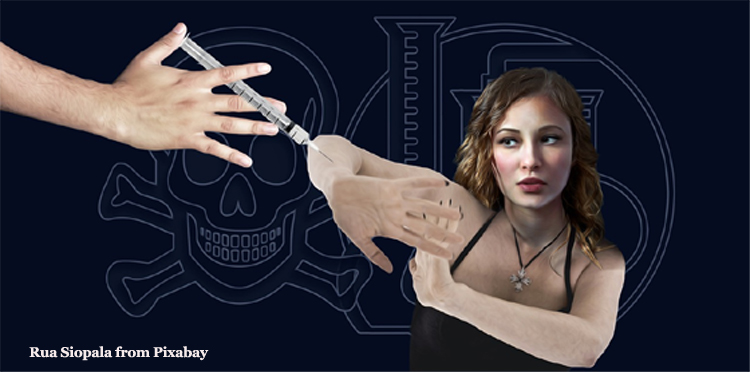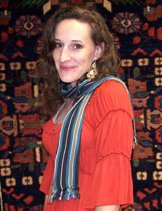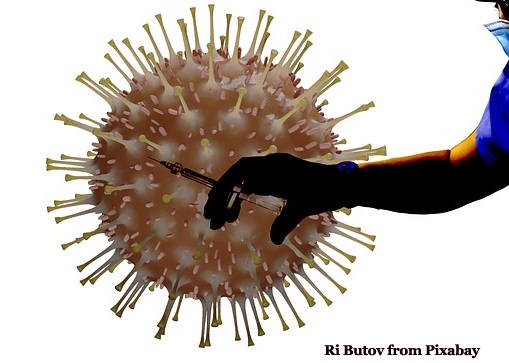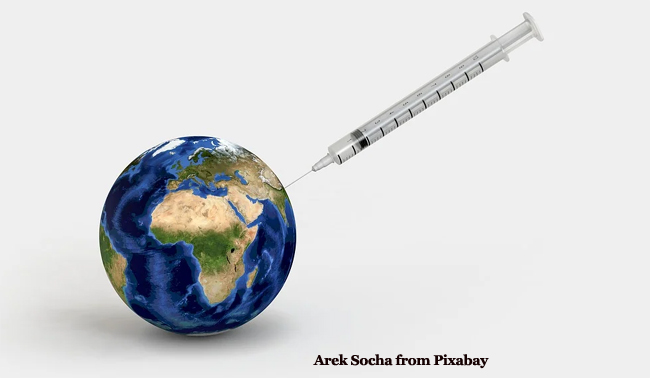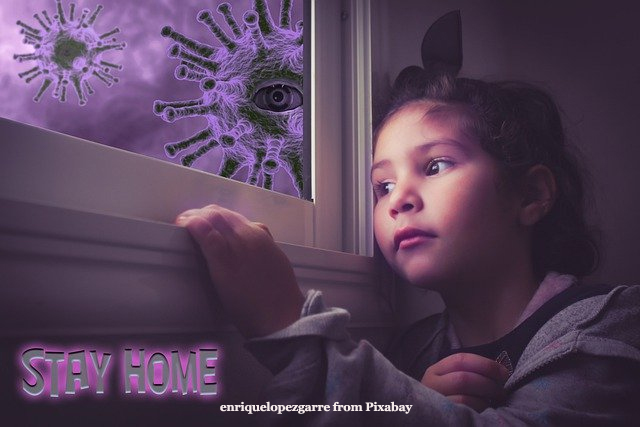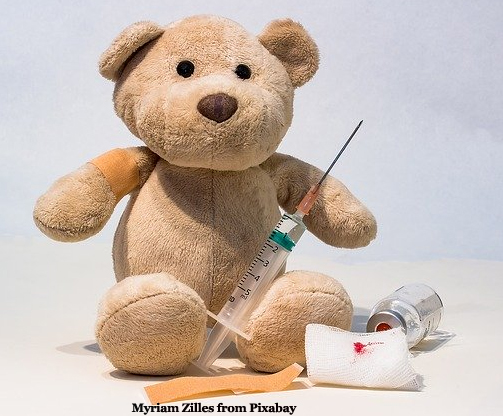ANTI-VACCINE MOVEMENT
THE ANTI-VACCINE MOVEMENT,
FAR RIGHT ACTIVISTS, and COVID-19
July 2020
The anti-vaccine movement in our country and around the world
may be of special concern in 2020 because of the COVID-19 pandemic. The anti-vaccine movement
is strongly associated with conspiracy thinking and the protection of individual
freedoms, traits that also find a home among far-right groups. For
example, anti-vaxers and those who protest the COVID-19 lockdowns have a
shared
commonality. Coverage from these protests often show people holding
signs with anti-vaccine rhetoric marching next to pro-militia activists
and white
supremacists.
It is also very concerning that the radical right on social media are turning the demographic of homeschooling to the right as well. This may leave many wondering just what will happen within the anti-vaccine movement today while so many companies in this country and others are racing for a safe and effective vaccine for the novel coronavirus.
THE CENTRAL DOGMA of the
ANTI-VACCINE MOVEMENT
The central dogma of the anti-vaccine movement is that vaccines cause autism and other bad health effects and that governments and the pharmaceutical industry knowingly suppress this information. It seems it is an attitude borne out of an irrational fear of chemicals. Anti-vaxers were very much a part of early efforts to stop the Food and Drug Administration from regulating alternative medicine.
There are many prominent spokespeople for the movement. These include Joseph Mercola, Robert F. Kennedy, Jr, many politicians, and even some presidents. This is why in the age of COVID we read about their ‘natural immunity theory’ that barriers to germs, like physical distancing and masks, weaken our immune system. Vaccines, they believe are just one more synthetic loaded gun aimed at our immune system.
ANTI-VAXERS-HOW THEY THINK
Research
has shown that there are some similarities on how an anti-vaxer tends to think
As a general rule, anti-vaxers tend to be:
Surprisingly, education was not linked to anti-vaccine beliefs.
THE ANTI-VACCINE MOVEMENT and SOCIAL MEDIA
People who espouse anti-vaccine views can find each other quite easily through social media. Although the social media giants have begun to crack down on vaccine misinformation, anti-vaccine communities can quickly adapt to the new rules. For ex., to be compliant the word ‘vaccine’ will disappear in the name of their group, replaced by ‘medical freedom.’
The numbers of online supporters of anti-vaccine views have been more successful than those publicly supporting vaccines, even though they are smaller in numbers. On Facebook, they get very heavily involved with clusters of Facebook users who have not yet made up their minds about vaccines.
They offer a wide variety of stories about safety concerns, about government conspiracies, and about natural immunity. These stories can attract a great diversity of people and this diversity is also encouraged by social media companies. Platforms like Facebook and You Tube want to hold the attention of their users so they recommend other content. These groups recruit followers in anti-vax and Facebook groups related to complementary and alternative medicine.
ANTI-VAXERS DO HAVE
GENUINE CONCERNS
Aside from conspiracy theories and pro-freedom sentiment, the followers of the anti-vaccination movement have some genuine concerns. These include:
- Tracking devices, such as concerns that being vaccinated would mean being chipped or tracked for the coronavirus.
- Common knowledge that most large nations dabble or have dabbled in bio-weapons research.
- Fear of new vaccines, though not a totally baseless fear.
- Confusion about medical patents and virus naming structures.
- Fear that vaccines will mutate our own DNA because of the fact that multiple coronavirus vaccines use the RNA of the virus.
Justified worries are fed by misunderstandings and further amplified by a conspiracist mindset in online communities. Along with radical political actors, this can lead to progressive vaccine-hesitant parents holding hands with the anti-lockdown movement.
ONE VERY COMMON PIECE OF MISINFORMATION ABOUT VACCINES...
One major piece of misinformation that seems to stay around in anti-vaxing circles is that the MMR (Measles, Mumps, Rubella) vaccines contain mercury and cause autism.
The Facts:
- The use of Thimeresol, which is a mercury-based preservative, has been used for decades in certain multi-dose vaccines. There are 2 types of mercury, methyl mercury and ethyl mercury. The vaccines use ethyl mercury, which easily leaves the body, not methyl mercury, which is found in fish and is toxic at high levels.
- There is no evidence of harm caused by the low doses of Thimerosal in vaccines, except for minor reactions like redness and swelling at the injection site. However, as of 2001, no Thimeresol has been used in childhood vaccines.
- The measles, mumps, and rubella (MMR) vaccines do not and never did contain Thimerosal.
- Varicella (chickenpox), inactivated polio (IPV), and pneumococcal conjugate vaccines have also never contained Thimerosal.
- Influenza (flu) vaccines are currently available in both Thimerosal-containing (for multi-dose vaccine vials) and Thimerosal-free versions.
- There is no scientific evidence that Thimeresol causes autism. Even after Thimerosal was removed from childhood vaccines, autism rates continued to increase, which is the opposite of what would be expected if Thimerosal caused autism.
If you have concerns about vaccines based on specific allegations you have heard, please see the website Anti-Anti Vax which addresses many of the specific claims of the anti-vax movement (such as above) and offers factual and science-based answers.
WHAT CAN PRO-VAXERS DO?
There are discreet actions pro-vaccine people and organizations can take to minimize the damage caused by anti-vaccine attitudes.
Because these attitudes tend to be tied to the belief in a grand conspiracy, the recent publication of the Conspiracy Theory Handbook can be of help. It delves into the difference between real conspiracies and conspiracy theories and can help if you are confused or if you wish to help someone else. The Handbook recommends:
- empowering people with facts,
- uncovering the bad logic in the initial argument.
- linking to fact-checking websites.
- exposing the lack of credibility of the sources of these theories.
It may be impossible to reach extremists, but those people who are on the fence, such as vaccine-hesitant parents, may be the best ones to approach. Having empathy with and really listening to the concerns of vaccine-hesitant parents and giving them factual information may be the best way to help improve their attitudes toward vaccines.
WHAT MAY HAPPEN WHEN CONRONAVIRUS VACCINES ARE APPROVED?
If and when safe and effective vaccines against the new coronavirus end up being approved, we may wonder how much public confidence will have been eroded by this re-energized anti-vaccine movement and their radical allies.Their movement is a small and vocal minority, but its fear-based messaging reaches a larger segment of the population which is the vaccine-hesitant.
People on the fence about vaccines are now being served an incredible buffet of anxieties from genuine concerns that a coronavirus vaccine may be rushed, to the loud cries of 'my body, my temple', all the way to stories of Bill Gates’ 'evil plan to depopulate the world,' with the occasional viral video like Plandemic (a 26-minute conspiracy theory video posted on social media promoting falsehoods and misinformation about the COVID-19 pandemic) fueling this unease with a veneer of respectability. How much damage all this will cause is anyone’s guess, but there is genuine reason to be worried.
Update: On 8/23/21, the FDA issued full approval of the Pfizer vaccine.
Some of the information contained in this article was reprinted by permission from the Office of Science and Society at McGill University.
"The Cleanest Clean You've Ever Seen."
by
ABC Oriental Rug & Carpet Cleaning Co.
130 Cecil Malone Drive Ithaca, NY 14850
607-272-1566
